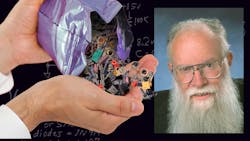This article is part of Bob Pease's Floobydust series found in the Electronic History section of our Series Library.
My old friend Robert M. Milne retired a few months ago as editor of Electronic Design after 23 years. RMM has been my main contact with ED for 15 years, ever since this column began.
Bob has been very helpful, and a really good sport, about editing my columns. He can slice a few words out of a sentence without wrecking it, or chop a couple of small sentences out of a paragraph without changing the meaning, quite an art. I will miss him a lot. He even tripped me up on technical errors and questioned me properly. I love the man.
Bob had fairly lousy health in the last few years, but a recent change of doctor has brought him some good advice: Cut out the calcium channel blockers. Now he is beginning to feel peppy, rather than like a zombie, so he can start enjoying his retirement. Maybe ducking the need to edit my column on deadline will even stabilize his blood pressure! Best wishes to you, Bob Milne. Keep questioning your doctors! Thanks for all the help and advice over those years.
DOCTORING STUFF, PART 4C—STROKE DIAGNOSIS Many people know that in case of a heart attack or stroke, it s very important to get the victim to medical care very quickly, within much less than an hour. But what do we know about diagnosing such an unhappy person?Defining a heart attack relies on asking the victim about various kinds of pain. Pain in areas near the heart can tell you that you should call 911. No comments on this today. But in case of a possible stroke, where a person may experience numbness or paralysis, particularly on one side of the body, what can we do as laymen?
First, ask the person to lift both arms and hold them out in front. Often, a stroke victim will be unable to bring up both arms or hold them up. They will droop. Serious clue.
Second, ask the person to smile! If the victim can t smile in a symmetrical way, you have another serious clue.
Third, ask the person to speak a simple sentence. I know some people who are barely able to pass some of these tests in normal situations! But barring that, call 911 and describe these serious symptoms. The dispatcher usually will send an ambulance promptly.
Treating a stroke within the first hour gives the victim a good chance to recover. Somebody who trips or starts mumbling (worse than usual) may be okay. But if you aren't sure, ask these questions, call 911, and explain how the person flunked these tests. The 911 dispatcher may ask other questions, like those at www.strokecenter.org/education/jauch/02.htm#Chain (old link).
After all, every one of us is getting older by definition. And as all of our friends get older, the likelihood of somebody having a stroke increases.
RELATED TOPIC
If you have medicines past their expiration date, please do not flush them down the toilet. Flushed medicines have been found to contaminate our waterways, leading to fish with hormonal afflictions, schizophrenia, and unhappy sex lives. Save those medications in a safe, locked place until a pharmacist or doctor tells you how to dispose of them safely. I keep most of my old medications in my freezer, so the effective expiration date is extended (except for aspirin, whose expiration apparently isn't extended by freezing).
About the Author

Bob Pease
Bob obtained a BSEE from MIT in 1961 and was a staff scientist at National Semiconductor Corp., Santa Clara, CA, for many years. He was a well known and long time contributing editor to Electronic Design.
We also have a number of PDF eBooks by Bob that members can download from the Electronic Design Members Library.
